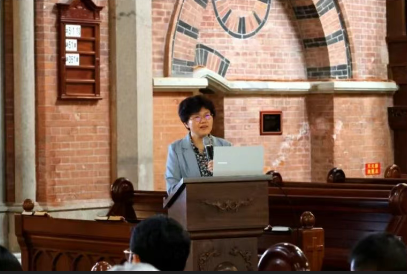Shanghai Holy Trinity Cathedral recently held a lecture on Christian marriage ethics, featuring Rev. Lin Manhong, vice president and general secretary of the China Christian Council.
Titled "Selections of Family Ethics in Christian Marriage and Families," the lecture given on Sunday examined key aspects of Christian family ethics, including the meaning and purpose of marriage, the dynamics between Christian spouses, relationships with parents and children, and perspectives on divorce.
Rev. Lin began by defining ethics, noting that while many Chinese Christians are familiar with Christian teachings and marriage, the concept of ethics may be less well understood. "Ethics is about the principles and norms that govern various relationships," she said. "In the context of Christian marriage and families, ethics refers to how Christianity approaches, understands, and manages various relationships within the family structure."
Drawing from Genesis 2:24, Rev. Lin emphasized that marriage is divinely instituted and intended as a covenant, marked by mutual support and encouragement, fidelity, a reflection of the relationship between Christ and the church, and the potential for procreation.
She challenged a traditional interpretation of the term "helper" in Genesis 2:18, which has often been understood to imply the subordination of women to men. According to contemporary scholarship, she noted, the Hebrew term translated as "helper" is also used to describe God's assistance to humans and partnerships between military allies, suggesting a relationship of mutual support rather than hierarchy. "The concept of being 'one flesh' indicates reciprocity and mutual care," she added.
Rev. Lin also addressed the topic of sexuality, emphasizing that it is to be expressed within marriage and should be rooted in love. "We do not encourage premarital sex," she stated. "Many people may mistake passion for love." She cited the biblical account of Amnon and Tamar as an example of how unchecked passion can lead to harm.
"Sex is a good gift from God and an expression of divine favor," she continued, "but it requires discipline. A person who can manage their emotions, desires, and fears can win over a king."
On the topic of divorce—a subject sensitive within the Chinese church context—Rev. Lin referred to the provisions in China's "Civil Code," which recognizes divorce as a legal right. She noted that while marriage should be valued and preserved, divorce may be justified in cases of infidelity, domestic abuse, cohabitation with a third party, or other serious issues. "But divorce is the last choice you can make," she added.
She shared an example from a foreign church where the pastoral staff advised a woman experiencing domestic violence to consider divorce for her safety if the situation did not improve. While initially surprised by the recommendation, Rev. Lin acknowledged that excessive tolerance can sometimes contribute to harmful behavior.
In discussing the roles of spouses, she emphasized the importance of mutual care and responsibility. She also highlighted the evolving nature of gender roles within marriage. "The traditional model of men working outside the home and women staying inside is outdated," she said. "Today, both partners typically participate in professional and domestic responsibilities. Passion may mark the beginning of marriage, but over time, the relationship is sustained by enduring familial affection and mutual consideration."
During the Q&A session, Rev. Lin responded to questions such as whether believers should marry non-believers and how the church might address the gender imbalance in China. Referring to biblical principles, she encouraged listeners not to adhere to overly literal interpretations. "If you move to a new area where there are no Christians, it is possible the other person could come to faith, but that is the work of the Holy Spirit," she said. She shared an example of a Christian woman who married a non-believer who respected her faith.
Regarding demographic imbalances, she acknowledged that the church cannot change the broader population structure but can foster community by organizing fellowship groups for single believers to encourage relationships and marriages.
Addressing concerns among young people about marriage and childbearing, Rev. Lin encouraged faith and trust in God's guidance. "If you want children, trust God," she said. "If you choose not to have children, God can still bless that choice, even though it may not align with the biblical command to 'be fruitful.' The essential thing is to live as people of faith."












